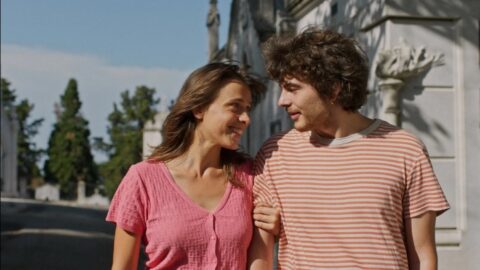“Of all things certain in life/There’s no surer thing than doubt.”
Nicolau (Francisco Melo) is stuck in a rut. One year out from breaking up with his girlfriend Inês (Margarida Dias), he still lives with his parents, and doesn’t know what he wants to do with his life. On his 24th birthday, he must be coaxed out to celebrate, before denying the sexual entreaties of beautiful Frenchwoman Chloé (Cécile Matignon). He says he’s tired, but the implication is clear: he isn’t over his ex-girlfriend and doesn’t want to commit to anything at all.
Thus begins João Rosas’ excellent The Luminous Life (2025), a study in flux that, in its specificity and generosity, captures the difficulties of finding love — and purpose — under the deprivations and inhumanity of late capitalism; where being a true drifter, a Slacker (Richard Linklater, 1990) as it were, feels harder than ever. Hot on the heels of Cannes sensation, I Only Rest In the Storm (Pedro Pinho, 2025), Rosas’ film is another Portuguese effort that captures the nuances and tides of life itself, through a tender male protagonist in search of meaning, fighting the privations of society at large. While lacking Pinho’s epic grasp, it is no less powerful in its aspirations, as well as its wit and humanity.
Eventually, Nicolau finds his way out of his parents’ apartment; he even lands a job at a stationery store. It’s here that the shop-owner knowingly quotes from Sartre:
“There is the dance of the grocer, of the trailor, of the auctioneer, by which they endeavour to persuade the clientele that they are nothing but a grocer, an auctioneer, a tailor. A grocer who dreams is offensive to the buyer, because such a grocer is not wholly a grocer.”
The implication, while draped in knowing irony1Par for the course in a film featuring a film professor who only talks exclusively in quotes from Bresson., lays clear the difficulty of higher aspirations in a world tethered to capital. Dreaming above your station will not just alienate you from your day job, but will make it hard to define yourself in a world that prioritises labour above all. This is particularly hard in austerity-hit Portugal, where many young people end up leaving due to the lack of steady income. Unfortunately for Nicolau, as he seeks to get over his ex, find a girlfriend, and maybe even make something of himself, becoming independent and being a success is never free from the wider web of capitalism at large.
This film will invariably be described as Rohmerian. Those comparisons are more than warranted. With his large mop of hair and heavy indecisiveness, especially when it comes to the fairer sex, Gaspard (Melvil Poupaud) from A Summer’s Tale (1996) comes to mind. Like Gaspard, he seems caught between possibilities — being a session musician; leaving the country; committing to one girl or the other — and seems unlikely to commit to anything until the very last frame. And like Rohmer, sex is intellectualised rather than fully portrayed: the details of the act are left to the imagination, while the implications are positively exhumed in deep, mannered conversations.
Most worthy of the comparison to Éric, however, is the way that the film feels plotless — dialogue-heavy walk-and-talks, people meeting in cute Lisbon restaurants, rolling cigarettes, smoking pot, drinking beer, going to parties — but has a deeply satisfying, classical construction at its core. It reminded me a little of the lovely French film The World After Us (Louda Ben Salah-Cazanas, 2021), which had a similarly touching examination of love and its relationship to work.
Not everything is perfect. The lighting and colouring in some scenes, especially those shot inside at nighttime, can feel rather flat; especially compared to the gorgeous lighting warranted by daytime shoots. But this lack of technical perfection is — much like Nicolau’s life — self-evidently tethered to the cost of the film production, which is almost certainly pretty low. I can’t wait to see what possibilities first-time feature director Rosas conjures up in his next work. We may have another Hong/Rohmer/Radwanski on our hands.
Redmond is the editor-in-chief of Journey Into Cinema.





